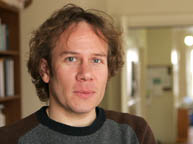Headliners: From foul fuel to transplant tourism
Headliners: From foul fuel to transplant tourism McGill University
User Tools (skip):
HEADLINERS
From foul fuel to transplant tourism
Star makers

BOYLE: Bon Jovi fan club
Claudio Calligaris
Far be it from the McGill Reporter to blow its own horn, but there seems to be a developing trend whereby McGillians profiled in our humble publication go on to be "discovered" by the rest of the world. Two recent cases in point: Dan Boyle, featured in our May 17 issue, was profiled in the Montreal Gazette. The PhD candidate in education is also an award-winning musician who claims his biggest fear is "ending up playing in a Bon Jovi tribute band."
Then there is Jessica Trisko, another PhD candidate (PoliSci), first profiled in our March 15 issue. A few weeks ago, Trisko made news around the world after being crowned Miss Earth 2007 earlier this month. Not just another pretty face, Canada's "Green Queen" is also the recipient of a scholarship from the Social Sciences and Humanities Research Council of Canada.
Maybe it's the methane…
As reported by the Canadian Press, a Quebec company plans to turn used diapers into a cost-effective source of diesel fuel. Apparently, the idea isn't as far-fetched as it sounds. If everything goes according to plan, in its first year of production the company will convert 30,000 tonnes of diapers into some 11,000 tonnes of cheap diesel fuel. That would reduce the amount of diapers currently being dumped in Quebec landfills by 25 percent. Don Smith, James McGill Professor and Chair of the Department of Plant Science, said if the project flies it would be very beneficial because "you're turning a waste stream into a resource stream."
Brother can you spare a kidney?

TURNER: Exposing transplant tourism
Owen Egan
Leigh Turner, William Dawson Scholar in McGill's Biomedical Ethics Unit, penned an op-ed in the Ottawa Citizen on the disturbing issue of transplant tourism. It seems like organ brokers around the world are hooking up people in desperate need of an organ transplant with people in desperate need of cash. Looking specifically at the situation in the Philippines, Turner described how organ donors, usually living in extreme poverty, rarely receive the full amount they have been promised and are often left debilitated following the surgery. He also warns buyers to beware as purchased organs aren't always adequately screened and can transmit infectious diseases.
Cyber bullies give Japan black eye

SHARIFF: Online aggression
Owen Egan
Cyber bullying is on the rise in the Land of the Rising Sun. According to a Reuters article, Japan is a particularly fertile ground for this growing worldwide trend because some 96 percent of high school students have cell phones—easy targets for email attacks. Shaheen Shariff, a professor in the Department of Integrated Studies in Education, says that cyber bullying may be tailor-made for a culture that minimizes face-to-face confrontations. "Are they [children] too controlled? Are they under too much pressure to be academically successful? Do they have an avenue to express their feelings?" were some of the questions she posed.

